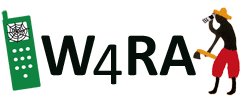In track 5 of the NDDHO event (Nationale Duurzaamheidsdag in het Hoger Onderwijs):
“Sustainability and ICT for development (ICT4D)”
Presented by Anna Bon, Victor de Boer, Francis Dittoh, André Baart and others 11.15 – VU Hoofgebouw, Auditorium
Prototype demos of ICT4D systems for rural Africa: Master students Information Science, Computer Science, Artificial Intelligence in the ICT4D course. 12.00 – 13.00 uur VU Hoofgebouw – foyer
There is a growing awareness that ICTs should serve a Sustainable World. For example, as part of the United Nations 2030 Agenda for Sustainable Development, the Sustainable Development Goal (SDG) No. 9c reads: “Significantly increase access to information and communications technology and strive to provide universal and affordable access to the Internet in least developed countries by 2020.”
This is however easier said than done, and this session shows how sustainability issues can be very different, depending on context. In a rural, low-resource low-tech context in e.g. Africa, electricity is often unavailable. Internet connections are absent, or unaffordable for an average income (of 1 EUR per day). Low literacy of the rural population makes conventional text-based apps irrelevant. Instead, mass communication is by voice over simple mobile (feature) phones.
Sustainability of ICTs, in this context, means robust and low-cost hardware, extremely low energy consumption, and context-sensitive software that meets the local requirements of mobile speech, language and voice-based interfaces.
Researchers and students from VU have set up a research program called W4RA (w4ra.org) to develop sustainable data services for farmers in Africa. These systems are developed and deployed in Mali, Ghana and Burkina Faso. The services are built in collaboration with end-users, who are involved in the design of prototypes, and in assessing the usefulness of data services for their work. This iterative co-creation ensures usefulness and sustainability of the services.
The services, which provide information of rainfall, animal health or other local topics, run locally on the sustainable Kasadaka (“Talking Box”) platform, in the absence of datacenters. The Kasadaka platform has specifically been designed and built to endure local, rural conditions, such as no internet, absent or unreliable energy sources, dusty environments, high temperatures.
ICT4D master course students from VU will demonstrate their various sustainable ICT4D applications and Kasadakas during the NDDHO.



